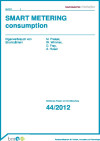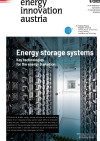Suchergebnisse für "Factsheet: Energietechnologien gestalten, die für alle sinnvoll und nutzbar sind"
CO2 neuBau - The CO2-neutral Construction Site: a Contribution to the Climate Protection by the Austrian Construction Industry
Identification of all direct and indirect CO2, respectively, GHG emissions generated at construction sites. Analysis of the framework conditions and technologies towards demonstrating the options for their control. In parallel, added values, such as cost-benefit advantages of a CO2-neutral construction site, were outlined and quantified.
VERTICAL FARMING - Investigation on requirements of a Vertical Farm-prototype development for crop plant production
In the center of interest stands the investigation of fundamental principles for a new building typology – the Vertical Farm. Urban vertical food production can contribute to more energy efficient cities by concurrently reducing land use. Substantial influencing factors to achieve these goals are intended to be revealed.
F4WM - Fit4WienerMission
Preparation for the EU Urban Mission by updating goals and strategies (Smart City Wien Framework strategy, Climate-Roadmap), developing a manual for climate-neutral Viennese neighbourhoods and concepts for the participation of citizens (Climate Citizens' Council) and businesses (Climate Agreements), as well as a city-internal capacity and structural planning.
Spatial Energy Planning for Smart City Quarters and Smart Regions
In the project ERP_hoch3 energy related policy research in three Austrian agglomerations (Vienna – Lower Austria, Graz – Styria and Vorderland-Feldkirch) has been done, scenarios of the current state and the target state have been modelled and calculated. The aim was to develop generic transferable recommendations for spatial energy planning in agglomerations.
Future Quarter - Way to an energy-plus quarter in Vienna
Development of transferable concepts for energy-plus quarters as substantial preparatory work for the implementation of an energy showcase quarter in Vienna based on six concrete areas. The support for the broad application of the concept shall be a precursor for the realisation of future energy showcase quarters in Vienna and other cities.
SURO - The urban underground as mine? Potential of secondary resources in subsurface infrastructure systems
Feasibility of a resource cadaster to inventorize, characterize and locate material stocks in subsurface infrastructure networks. The results are used for the economic assessment of secondary resource potentials.
Ecodesign

Initiatives and measures for the promotion of an environmentally sound product design
Forschungsforum
2/1995
Herausgeber: BMVIT
Englisch, 6 Seiten
Smart Metering consumption

Eigenverbrauch von Stromzählern
Schriftenreihe
44/2012
M. Preisel et al.
Herausgeber: BMVIT
Deutsch, 110 Seiten
Downloads zur Publikation
Low Tech - High Effect! An overview of sustainable low-tech buildings: realized best practice examples, innovative approaches, principles and systematic solutions
In this study approaches of low-tech buildings were examined and particularly innovative and representative concepts were documented in detail. The aim was to elaborate the current state of the art and the existing know how and knowledge on the basis of realized examples as well as to show potential for further development.
RENEW SCHOOL Austria: Examples and financing models for school renovations
The project aimed at learning from 14 Austrian school buildings, from their financial and cooperation models, meaning successful cooperation between involved parties. The success factors have been derived from these projects and together with 10 best practice schools been published in a brochure. The project supported the Austrian activities in the IEE EU-Projekt RENEW SCHOOL (www.renew-school.eu).
Regional acceptance of biogas power plants - suitability and availability of energy-plants
Development of an calculation tool for future biogas power plant operators and planners to check the regional acceptance of their power plants as well as possible energy-plants and their availability.
Development of a starch based thermoplastic Biopolymer as substitution of standard polymers in niche applications
Developement of a businessnetwork for the market implementation of biodegradable products made out of renewable substances.
Solar cooling machine with a cooling power of 2 kW

Development and building of a prototype of a coolingmachine with a cooling power of 2 kW, tests and optimizing on a test facility, connection to a solar unit and utilization for air conditioning.
LightFromFacade - Optimized Day- and Artificial Lighting by Facades
Multfunctional facades with integrated artificial- and daylighting systems had been simulated and evaluated regarding lighting and energy (lighting quality and energy demand). The results create basics for further façade developments and for academic education.
Energy storage systems

Key technologies for the energy transition
energy innovation austria
5/2021
Herausgeber: BMK in cooperation with the Climate and Energy Fund
Englisch, 16 Seiten
Downloads zur Publikation
OPEN LIVING PLUS - building structures and utilization options with high social functionality and plusEnergie-standard for rural regions
In small to medium sized communities in rural Regions there is a high demand for sustainable building and space for innovative living facilities, to satisfy the requirements of current and coming life designs. The project’s intentions were to provide social scientific groundwork, develop building structures and utilization options of high social functionality and to transfer knowledge to decision makers in communities and regional authorities.
Development of a method and an innovative machine for the industrial application of environmentally friendly, mineral oil free lubricants in deep drawing processes
Eliminating the usage of mineral oil based lubricants in deep drawing processes by an innovative machine for clean application of environmentally friendly wax-based forming emulsions.
BIGMODERN - Subproject 5: Feasibility studies about innovative technical solutions
The application of innovative technologies means additional planning and coordination effort which usually cannot be incorporated into the conventional planning processes of the BIG. To overcome these barriers for the application of innovative technologies, the sub project at hand aims at preparing information, feasibility studies, planning records, experiences and practical examples in a way, that they can be implemented directly into the planning process.
G2G – Innovation axis Graz-Gleisdorf
Development of testbeds and demonstration zones within already designated areas for urban development along the Graz-Gleisdorf Innovation-Axis with a focus on energy, integrated building technology, smart city-spaces, compact settlement structures, generational living, and ‘cities of short ways’. It will pay specific attention to intermodal mobility as well as ICT-based solutions.
